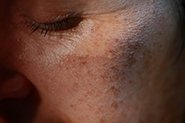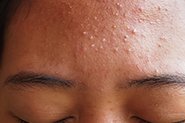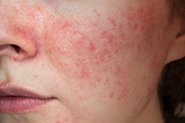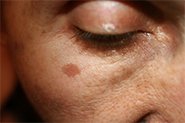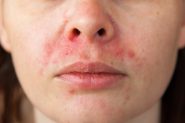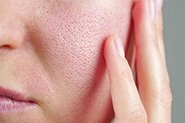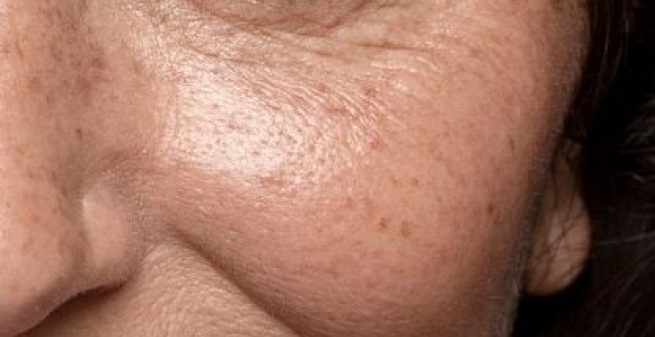
Qr8’s Founder, Dr Michele Squire, is here to spill the tea on using Vitamin C to treat Melasma.
Dealing with pigmentation issues is a frustrating and distressing experience, especially if you have melasma. This skin pigmentation disorder is often chronic and can be difficult to treat, leaving many people willing to try just about anything to improve it.
Melasma is a condition where dark, irregular patches of pigmentation appear on the face, often triggered by hormonal changes along with sun exposure. It’s more common in women, especially during pregnancy or while taking birth control pills. While it’s not harmful, it can be challenging to manage and can have a significant impact on self-esteem and quality of life.
It’s no wonder that those suffering from melasma often turn to multiple different treatments to help manage their condition. One such treatment that is easily obtainable from any skincare retail store, is vitamin C. But, is it truly effective in treating melasma?
Firstly, what do we mean by ‘Vitamin C’?
When we talk about vitamin C, we’re referring to L-ascorbic acid (L-AA), which is the only form of topical vitamin C that is biologically active in the skin (the term for this is ‘bioavailable’). L-AA is water soluble, so getting it to penetrate through the lipid-rich skin barrier requires some expert manipulation to reduce the pH of the formula (make it acidic). Applying acidic products can be irritating for some people – especially if you are in the early stages of using prescription skincare, have skin barrier issues, or skin conditions like rosacea and peri-oral dermatitis.
L-AA is also an antioxidant, making it useful (under sunscreen of course!) for added protection against UV-induced oxidative damage. But this also makes it fickle – it becomes unstable when added to water in a solution, unless properly formulated with other antioxidants. This formulation technique often makes vitamin C serums smell funky (the famous ‘hot dog water’ smell!). Correct packaging is also vital to minimise degradation when exposed to light and air.
What about the Vitamin C ‘derivatives’?
For all its popularity, L-AA has caused the beauty industry a massive headache – mostly because products need to be stable enough to last a decent period of time on the shelf, and after you open them. To overcome penetration, stability and efficacy issues, the industry developed vitamin C ‘derivatives’ by sticking other molecules onto L- AA and calling them some truly tongue-twisting names (try saying 3-O-ethyl ascorbic acid or tetrahexyldecyl ascorbate quickly!). Scientifically speaking, these derivatives aren’t actually ‘vitamin C’ at all, and the evidence supporting the efficacy of these derivatives is mixed at best (we dug into the science of the most popular derivatives, starting HERE).
So what about L-ascorbic acid and pigmentation?
Scientific evidence suggests that well-formulated L-ascorbic acid has some depigmenting ability for mild pigmentation due to its ability to chelate copper ions, which serve as enzymatic cofactors for tyrosinase (the enzyme crucial for pigment production in the skin). So in theory, if L-AA can get to the epidermis, it should inhibit pigment formation.
What does the evidence show about Vitamin C as a treatment for Melasma?
Just because it ‘can’ inhibit melanin production, doesn’t mean that L-AA is an effective therapy for for treating more severe forms of pigmentation, like melasma. And if you have melasma, you want to be treating it with the most effective treatment you can get!
There are only 2 available studies using vitamin C alone as a treatment for melasma. Both used 5% L-ascorbic acid.
One study found that 29 subjects who had vitamin C applied twice weekly for 12 weeks to half their face, and distilled water to the other half, showed greater pigment decrease (measured using an instrument known as a calorimeter) on the vitamin c side. However, when asked to grade their own results, participants (who had no idea which side of their face had the vitamin c applied, and which side had just plain water) were unable to tell the difference, reporting that both were equally effective. This essentially means that, although a result could be detected when measured objectively, there was actually no visible effect on the melasma.
The second study (which was so poorly designed, we can’t rely on the results), used the same split-face method. This time, 16 subjects applied 4% hydroquinone on one side of their face, and 5% L-ascorbic acid on the other. Participants used this regime once daily for 16 weeks, and results were again assessed using both a colorimeter and a subjective grading by the patients. This time there was no difference between the results for either vitamin c or HQ when measured using the colorimeter, but 93% of participants graded their results as ‘good to excellent’ on the HQ side, vs 63% on the vitamin c side.
So, what is the most evidence-based treatment for Melasma?
Firstly, it’s worth understanding that there are grades of evidence for recommending a medical treatment. These grades are based on the quality of scientific evidence that a treatment is effective for a certain condition. For example, Treatment X is Grade A = the most effective, Treatment Y is Grade C = much less effective.
A few of these grading systems exist to help systematically collate and make sense of the years and years of scientific evidence that underpin medical practice. One of the best known is called the OCEBM system. This system was developed by the Oxford Centre for Evidence-Based Medicine, based at Oxford University.
So let’s examine the OCEBM gradings for melasma treatment:
Grade A
Hydroquinone 4% + Tretinoin 0.05% + a topical steroid
This means that this triple combination of ingredients (which forms the basis of our treatment cream) has the highest level of evidence, based on all available scientific studies.
Grade B
Tretinoin 0.05%
When used alone, tretinoin is not as effective as when combined with hydroquinone and a steroid.
And vitamin C? It get’s the lowest grade – a D.
So, what’s our recommendation?
Overall, while L-ascorbic acid may have some depigmenting ability for mild pigmentation, it’s not even close to the most effective treatment for melasma. It’s essential to focus on treatments with the highest quality of supporting evidence (like the triple combination of ingredients we described earlier, with the highest grade of evidence), and to seek professional advice if you have melasma.
Once you’ve achieved fading results, maintaining them with a variety of antioxidants, including vitamin C, can be beneficial. Other science-backed antioxidants include tretinoin, ubiquinone (CoQ10), resveratrol, and azelaic acid, and these are all available to include in your customised maintenance treatment at Qr8.
It’s also worth noting that different skin types and levels of pigmentation may require different treatment approaches. For example, those with darker skin tones are at a higher risk of post-inflammatory hyperpigmentation (PIH), which is why it’s important to seek professional advice before starting any treatment.
Our experienced dermatology nurse works with all Qr8 patients to create a simple, inexpensive and personalised skincare routine to support your treatment! Read more about how our melasma treatment works HERE
REFERENCES
- Huh CH, Seo KI, et al. A randomized, double-blind, placebo-controlled trial of vitamin C iontophoresis in melasma. Dermatology. 2003;206(4):316-20. PMID: 12771472.
- Sarma N, Chakraborty S, et al. Evidence-based Review, Grade of Recommendation, and Suggested Treatment Recommendations for Melasma. Indian Dermatol Online J. 2017 Nov-Dec;8(6):406-442. PMID: 29204385.
- McKesey J, Tovar-Garza A, Pandya AG. Melasma Treatment: An Evidence-Based Review. Am J Clin Dermatol. 2020 Apr;21(2):173-225. PMID: 31802394.
- Espinal-Perez LE, Moncada B, Castanedo-Cazares JP. A double-blind randomized trial of 5% ascorbic acid vs. 4% hydroquinone in melasma. Int J Dermatol. 2004 Aug;43(8):604-7. PMID: 15304189.
- https://www.cebm.ox.ac.uk/resources/levels-of-evidence/ocebm-levels-of-evidence
WOULD YOU LIKE TO CHAT TO ONE OF OUR FRIENDLY DOCTORS ABOUT YOUR SKIN CONDITION?
CLICK HERE TO BOOK A CONSULT WITH OUR EXPERIENCED MEDICAL TEAM.


